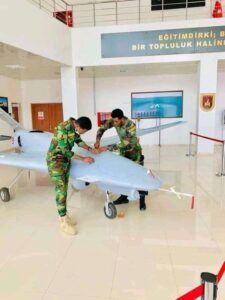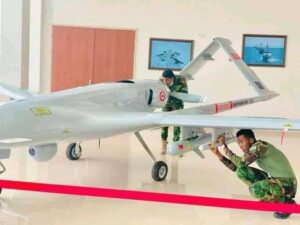UN investigators have concluded that Turkey violated international sanctions on Somalia by supplying armed drones without notification to and approval of the UN.
According to the Panel of Experts on Somalia, which monitors the conflict in Somalia pursuant to the relevant UN Security Council resolution, Turkey violated the UN arms embargo by delivering armed Bayraktar drones, which are manufactured by a company owned by the family of Turkish President Recep Tayyip Erdogan.
The confidential intelligence obtained by the UN investigators indicated that Turkey delivered Bayraktar TB2 drones to Mogadishu on December 6, 2021 via two Airbus A400M military cargo planes operated by the Turkish Air Force. Yet the Turkish government failed to file for an exemption with the UN before sending the drones despite the fact that the UN Security Council resolution explicitly specifies such clearance before the delivery of any arms to Somalia.
In response to letters of inquiry from the UN, Turkey claimed it had delivered the drones to a Turkish base in Mogadishu and that the goal was to contribute to the fight against terrorism. “Türkiye informed the Panel that it has not delivered any type of unmanned combat aerial vehicles to the Somali authorities and that the systems in question are assigned to be used by Türkiye in the fight against terrorism in Somalia,” the report issued by the UN experts on September 1, 2022 stated.
Excerpt from the UN’s recent report which states that Turkey violated an arms embargo by supplying drones to Somalia:
However, Turkish media reported that Somali officers were undergoing training in Turkey on how to use the drones as early as March 2021 and reportedly took possession of five drones, challenging the official narrative of the Turkish government that the drones in Somalia were intended for the use of Turkish troops stationed there.
UN teams have monitored and registered weapons and ammunition officially imported by the Somali government since the partial lifting of the arms embargo in 2013. Countries that send arms and weapons need to notify the UN and secure approval for such shipments. Somalia has received approximately 27,000 weapons and 80.1 million rounds of ammunition, including some 70,000 RPG-7 rounds, since 2013.
According to UN Security Council Resolution 2607 (2021), the arms embargo does not apply to supplies of weapons or military equipment for the United Nations Assistance Mission in Somalia (UNSOM) and the African Union Mission to Somalia (AMISOM), a peacekeeping mission operated by the African Union in Somalia with the approval of the UN. All other foreign troops in Somalia including Turkish forces must have clearance from the UN to receive arms and ammunition.
Turkey has repeatedly been flagged by the UN in recent years for arms violations in Somalia. A Turkish-based maritime company in April 2021 delivered military trucks to Somalia without informing the UN about their compliance with the sanctions requirements, which prompted UN investigators to launch a probe into the shipment.

Somali soldiers are seen inspecting a Bayraktar drone in Turkey.
According to the intelligence obtained by UN experts, İstanbullines Lojistik ve Denizcilik Limited Şirketi offloaded 44 “Kamaz” military-type trucks at the port of Mogadishu on April 30, 2021. The freighter that transported the trucks to Somalia had departed Turkey on April 15, 2021 and sailed via the Suez Canal to anchorage in Jeddah, Saudi Arabia, before docking in Mogadishu.
The UN said no notification was received from the company or the Turkish government about the shipment. The panel sent an official letter to İstanbullines on June 8, 2021 asking for information about the delivery in order to determine if it was in compliance with UN arms embargo requirements.
A review of İstanbullines’ trade registry records by Nordic Monitor shows that the company was established on March 23, 2018 by Najjar Oussama, listed as a Lebanese national. Two companies, investment firm Nesmal Yatırım Holding and aviation company Onur Havacılık Ticaret Anonim Şirketi, were listed as shareholders in İstanbullines. Oussama is involved in Nesmal and serves as chairman of the board, meaning he calls the shots at İstanbullines, where he has a controlling stake directly and by means of other companies.
Oussama also filed papers with Turkish authorities In December 2019 asking that his Lebanese nationality in the registration of his companies be replaced with his newly obtained Turkish nationality. He most likely managed to acquire Turkish citizenship through investments he made in Turkey.

Somali troops underwent training in Turkey on how to operate Bayraktar drones.
Turkish President Erdogan’s Islamist government has invested militarily and economically in Somalia, built a military base in Mogadishu and helped shady Turkish businesspeople acquire port and airport deals. With the help of Erdogan in 2014, management of the Mogadishu harbor facilities was handed over to the Islamist Albayrak Group, a Turkish conglomerate accused of corrupt practices in Turkey and abroad.
Bayraktar drones are manufactured by Istanbul-based defense contractor Baykar Makina Sanayi ve Ticaret Anonim Şirketi (Baykar), which is run by Erdogan’s son-in-law Selçuk Bayraktar. The company has landed major contracts with the Turkish government as well as with foreign countries because of the considerable support it receives from Erdogan, who lobbies for the sale of drones to the Turkish Armed Forces as well to other countries.
Nordic Monitor previously published a classified report by Turkey’s Financial Crimes Investigation Board (MASAK) that showed how the Erdogan government had hushed up a probe into hundreds of thousands of dollars in aid to al-Shabab. According to the MASAK report, the Turkish Foreign Ministry sent letter No. 48378 to MASAK on March 22, 2013, attaching a request for information sent by the US Treasury’s Office of Terrorism and Financial Intelligence, led by Under Secretary David S. Cohen at the time.
The intelligence picked up by the Americans indicated that Turkish national İbrahim Şen and his brother Abdulkadir Şen were involved in delivering $600,000 to al-Shabab between September and December 2012. Turkish authorities squelched the probe into the Şen brothers. A 2014 terrorism investigation in Turkey revealed that İbrahim Şen was working with Turkish intelligence in recruiting jihadists to fight in Syria and providing logistical supplies to them. Şen was previously a detainee at Guantanamo before he was handed over to Turkey in 2005.